

American Journal of Psychology, 4, 362–380.īoswell, S. Psychological Bulletin, 35, 1–25.īolton, T. (Original work published 1905)īlankenship, A. The development of intelligence in children (The Binet-Simon Scale) (E. International Review of Research in Mental Retardation, 1, 1–19. A functional analysis of retarded development. London, England: Cambridge University Press.īijou, S. Remembering: A study in experimental and social psychology. The role of span in a variety of intellectual tasks. Span and the complexity of stimulus control. Michigan State University, East Lansing, MI.īachelder, B. The memory span paradigm: Its use for the analysis of mental retardation. Spence (Eds.), The psychology of learning and motivation: Advances in research and theory (Vol. Human memory: A proposed system and its control processes. Englewood Cliffs, NJ: Prentice-Hall.Ītkinson, R. Horton (Eds.), Verbal behavior and general behavior theory (pp. The doctrinal tyranny of associationism: Or what is wrong with rote learning. Working memory and intelligence: The same or different constructs? Psychological Bulletin, 131, 30–60. The values of span ability and span load are potent tools for the prediction and control of developmental and individual differences in diverse experimental paradigms drawn from both behavior analytic and general experimental traditions.Īckerman, P. Span limits increase during the developmental period and covary with intelligent function. There is no known limit to the length of a chain that can be attained through extensive experiential history, but the memory span experiment assesses the length of response strings that are severely limited at around 7 items (the span limit) and are quite resistant to change. Response chains are emitted intraverbals. The theory distinguishes response string from response chain on the basis of the locus of stimulus control the response string is controlled by the multiple stimuli in a stimulus string or stimulus complex. Span ability is assessed via standard memory span procedures. Span load is a count of the number of discriminative stimuli that function concurrently to occasion responding. Established empirical limits on memory span are described in terms of span ability, namely, the ability to function under span load. This experiment has been used to investigate hypothetical mental and neurological processes and intelligent function, but behavioral span theory takes the standpoint of event-based constructs. The purpose of this article is to present a behavioral theory of performance in the simple (classic) memory span experiment.


 0 kommentar(er)
0 kommentar(er)
